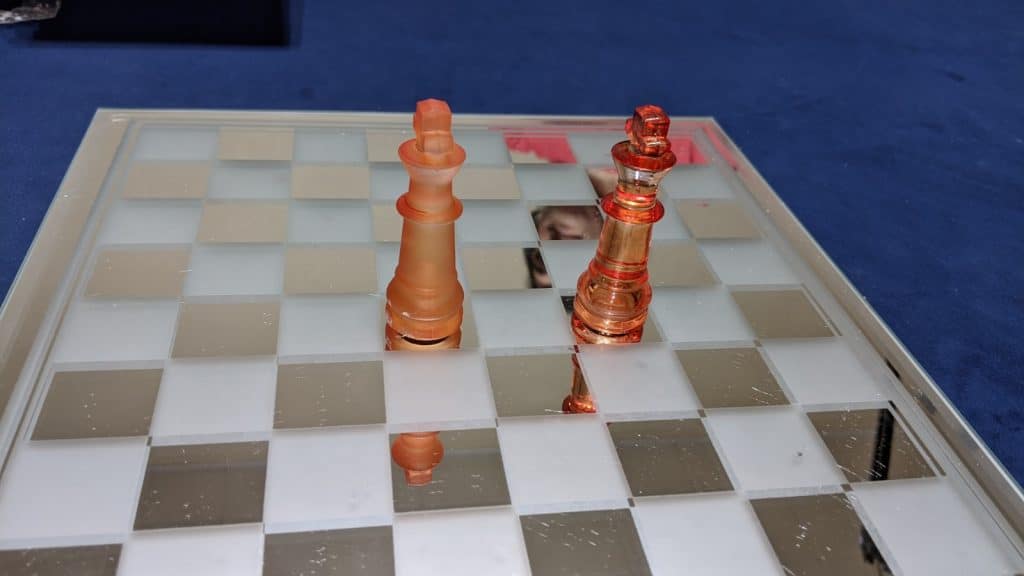Chess was one of my favorite games growing up. Before board games really hit their full stride with games coming out for players of all ages, chess was a major part of my gaming experience growing up in the late 80’s and through the 1990’s. In fact, I pushed hard in high school to allow chess to be played in study halls and founded the Chess Club of Belle Plaine High School.
Interesting hypothetical questions sometimes come up, though usually they are pretty easy to solve if you know the rules better, such as “Can a king kill a king in chess?”
A king can not kill another king in chess. This is because the rules forbid a player from making a move that puts their king into check. Since kings can only move one space at a time, a king can never get close enough to another king to kill it without putting themselves in check first. This makes it impossible to directly take a king with another king in chess. A king can be used to trap another king in a restricted area as another piece moves in for the actual checkmate.

While this is a question that is very easy to answer for true novices or non-chess players, that doesn’t mean that chess isn’t an incredible and elegant game with its wide range of great mysteries.
- What is the most beautiful game ever played?
- What is the most elegant offense?
- What is the most elegant defense?
These are just a few of many questions that cause fierce debate from basic fans to actual grandmasters of chess.
But when it comes to kings taking kings, because of the rule they will always have a space between them. While the caption of the above picture might be a bit tongue in cheek, the title of “eternal stand-off” is just as accurate as “eternally separated.”
So if someone says the king was involved in a checkmate, what do they actually mean?
The King as an Unlikely Aide
A king is actually the only piece on the chess board that can’t be taken by another king. While it’s unusual in most games for a king to take out a rook or a queen, it is hypothetically possible.
That doesn’t mean that a king can’t serve any part in how a game is decided. In games between two very evenly matched players often the smart use of a king in support position can be the difference between a win, loss, or tie.
In these situations the board has usually seen most pieces of both players removed, and the focus will often be around a handful of pawns, the kings, and possibly a single knight or bishop in the mix.
The king is used to reduce the number of spaces an enemy king can move forward, limiting its ability to move around a pawn or give guard to another piece. While most games among high ranking players don’t end this way, it’s worth noting that this is something that can happen where the king is used with one piece to corner an opposing king, and then the last bigger point piece whether knight or bishop or rook comes in to finish the job with the actual checkmate.
These situations are referred to as “End Game” situations because that is when they will pop up. The following video from the St. Louis Chess Club is a fantastic example of good end game scenarios.
In Conclusion
There are some beautiful hypotheticals when it comes to chess strategy, and even after thirty years I’m still learning to appreciate certain plays and games as being incredibly beautiful and elegant. The king is as basic and functional as a queen is powerful and respect-inducing,
Admittedly for many modern strategy junkies chess isn’t going to be a top board game for the casual gamer. A many centuries old game is going to have a hard time competing with modern board games for the attention of many gamers. That doesn’t make chess any less beautiful or elegant, and it is still an amazing way to introduce young children to the games that really teach you to think and focus on strategy.

Proud to embrace the locally created moniker of “Corrupt Overlord” from one of the all time great Lords of Waterdeep runs, Shane is one member of the Assorted Meeples crew and will be hard at work creating awesome content for the website. He is a long-time player of board games, one time semi-professional poker player, and tends to run to the quirky or RPG side of things when it comes to playing video games. He loves tabletop roleplaying systems like Dungeons & Dragons, Pathfinder, Werewolf, Fate, and others, and not only has been a player but has run games as DM for years. You can find his other work in publications like Level Skip or Hobby Lark.
